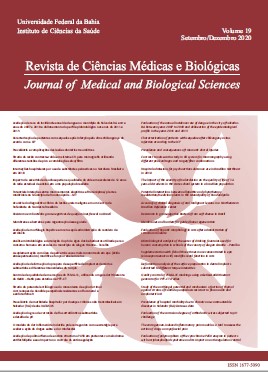Resistome in gram-negative bacteria from soft cheese in Brazil
DOI:
https://doi.org/10.9771/cmbio.v19i3.35460Keywords:
Antibiotic Resistance, food, resistome, Gram-negative bacteria, cheese.Abstract
ABSTRACT
Objectives: evaluation of antibiotic resistance in Gram-negative microbiota from ready-to-eat cheese samples.
Methodology: this research applied a specific method to evaluate the phenotypic susceptibility to antibiotics in a viable Gram-negative microbiota. The selected food was a cheese that is commonly consumed without thermal processing, the Minas Frescal cheese. The evaluation was followed by a PCR screening in this resistant microbiota, for genes that provide resistance to antibiotics and also to the quaternary ammonium.
Results: all cheese samples demonstrated a resistant microbiota. In 13.3% of the cheese samples analyzed, the resistance reached all ten different antibiotics tested and, in 80%, 8 to 10 different antibiotics. In antibiotics considered critics as the carbapenems: ertapenem presented resistant microbiota in 86.7% of the samples. In cephalosporins, the resistance reached 100% in the third generation (ceftazidime) and almost half of the samples (46.7%) in the fourth generation (cefepime). In genotypic research, seven different resistance genes were found in 69.2% of the bacterial pools, including the beta-lactamase-producing genes ctx, tem, shv, tetracycline resistant genes and a high rate of integrons class 1 and 2.
Conclusions: the results indicate phenotypically and genotypically that the Minas frescal cheese can present potential resistant microbiota. Therefore, the methodology used is a viable possibility and with a broader answer about the food microbiota role in resistance. This research corroborates the food area as an important sector to be managed to reduce the process of antibiotic resistance.Downloads
Downloads
Published
How to Cite
Issue
Section
License
Copyright (c) 2020 Journal of Medical and Biological Sciences

This work is licensed under a Creative Commons Attribution 4.0 International License.
The Journal of Medical and Biological Sciences reserves all copyrights of published works, including translations, allowing, however, their subsequent reproduction as transcription, with proper citation of source, through the Creative Commons license. The periodical has free and free access.


